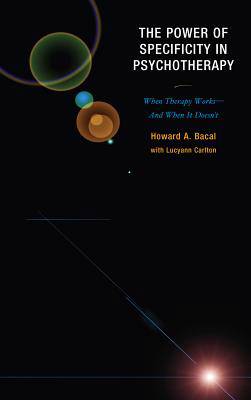
- Retrait gratuit dans votre magasin Club
- 7.000.000 titres dans notre catalogue
- Payer en toute sécurité
- Toujours un magasin près de chez vous
- Retrait gratuit dans votre magasin Club
- 7.000.0000 titres dans notre catalogue
- Payer en toute sécurité
- Toujours un magasin près de chez vous
The Power of Specificity in Psychotherapy
When Therapy Works-And When It Doesn't
Howard A Bacal, Lucyann Carlton
Livre relié | Anglais
183,95 €
+ 367 points
Format
Description
The Power of Specificity in Psychotherapy: When Therapy Works-And When It Doesn't presents specificity theory, a contemporary process theory of psychotherapy that holds that each therapist-patient dyad constitutes a unique reciprocal system, challenging us to reconsider how psychotherapy is optimally practiced and taught. The perspectives of specificity theory are corroborated by cutting-edge findings in neurobiology and infant research and alter traditional views of how we understand and utilize "theory," "response," and "relationship" in both treatment and training.
Spécifications
Parties prenantes
- Auteur(s) :
- Editeur:
Contenu
- Nombre de pages :
- 180
- Langue:
- Anglais
Caractéristiques
- EAN:
- 9780765707697
- Date de parution :
- 28-12-10
- Format:
- Livre relié
- Format numérique:
- Ongenaaid / garenloos gebonden
- Dimensions :
- 155 mm x 231 mm
- Poids :
- 439 g

Les avis
Nous publions uniquement les avis qui respectent les conditions requises. Consultez nos conditions pour les avis.






